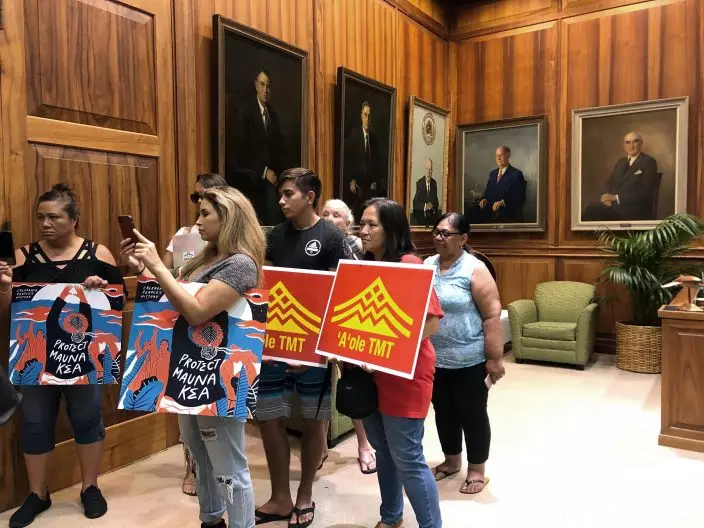Gov. David Ige said Friday he and other state employees received death threats amid the heated debate over building a giant telescope on the state's highest peak.
Ige disclosed the threats as he and his cabinet members held a news conference asking people on all sides of the issue to be careful with their language.
Attorney General Clare Connors played a voicemail recording in which an unidentified man told a state employee, "I hope you die."

Opponents of a giant telescope planned for Hawaii's tallest mountain listen to a protest leader talk to reporters in the governor's office in Honolulu on Friday's Sept. 13, 2019. State officials are concerned about hateful language used on both sides of the heated debate over whether to build the Thirty Meter Telescope. (AP PhotoJennifer Sinco Kelleher)
She showed reporters a social media post offering a $5,000 reward for the identity of a law enforcement officer involved in last week's demolition and removal of a small wooden house built by demonstrators near the camp where they are blocking the telescope's construction.
"I hope that we can all agree that putting a bounty on the head of law enforcement officer is disturbing and deeply concerning," Connors said. "It's dangerous. This law enforcement officer showed up to work that day and was doing his job when he found himself in an untenable situation."
The issue of the Thirty Meter Telescope issue has engulfed Hawaii since mid-July when the state announced construction would begin after a decade-long permit and appeals process. Protesters have blocked the road to Mauna Kea's summit for the past two months, preventing the building from getting underway. They oppose construction because they believe the top of the mountain is sacred.
Ige said there's been improper language on both sides, noting he's seen "terrible and racist" things written about protesters in the comment sections of news sites online.
"Whatever happens to this project, those kinds of postings are not acceptable here. They don't represent who we are and I urge the public to completely reject them," Ige said.
William Aila, the chairman of the state Department of Hawaiian Home Lands, said he fears the rhetoric will incite someone to do harm. He said state employees and their families are deeply affected by the attacks on social media.
"This is not the fabric of Hawaii that I grew up knowing," Aila said.
One of the protest leaders condemned the hateful language and the act of putting a bounty on anyone.
"Our message to people on social media is to maintain kapu aloha," said Andre Perez, using the Hawaiian term for a philosophy of peace and nonviolence the protesters have vowed to adopt while they oppose the telescope.
"Don't put out violent language. Do not target individuals. Do not post people's personal info that puts them at risk," Perez said.
He said their focus isn't about attacking or hurting people. "We are here to protect a sacred mauna," he said, using the Hawaiian word for mountain.


